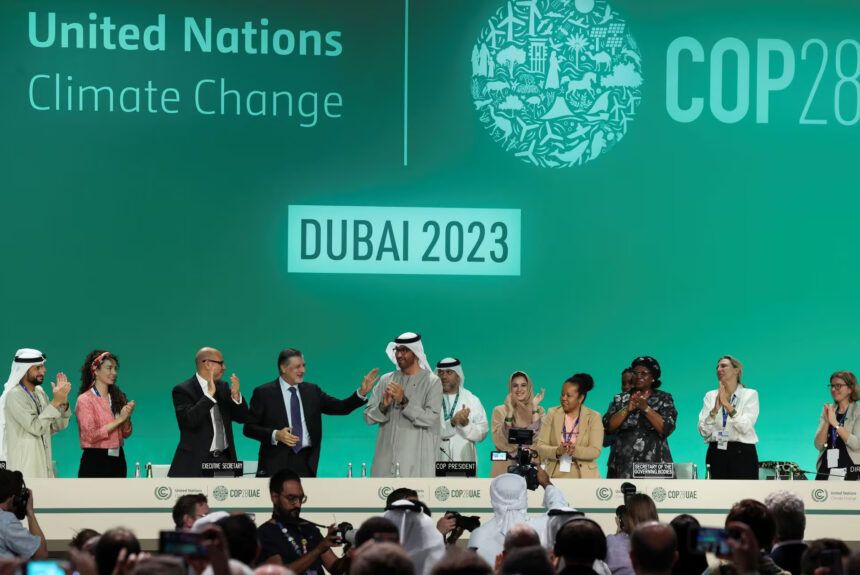In what is simultaneously receiving praise for being a historic achievement and criticism for not being ambitious enough, nearly 200 countries closed COP28 by agreeing to transition away from fossil fuels in energy systems. The agreement calls for a tripling of renewable energy capacity and expanded use of carbon capture and other low and zero-emissions technologies. The nuance of the language is what one should expect when climate goals run up against the realities of the world needing more affordable energy, particularly when 80 percent of those energy needs are met by fossil fuels.
>>>READ: COP28: Economic Freedom is the Solution
Any transition in the world’s energy system will not come from language hammered out in the 11th hour in Dubai, but when it is in the economic self-interest of communities and businesses to pursue cleaner alternatives. The policies that unleash bottom-up innovation and human ingenuity to meet the needs of consumers while reducing emissions are the most durable path forward.
Like many previous COP commitments, the promise to transition away from fossil fuels may be as empty as the New Year’s resolutions to eat healthy that are broken by the Super Bowl. Or it could mean transitioning from four Oreos after dinner to three. Energy systems around the world could shift from 80 percent reliance on fossil fuels to 75 percent reliance. While such a gradual transition would likely not achieve the desired target of net zero by 2050, it is a nod to the economic and environmental tradeoffs countries must consider. As the language in the communiqué states, the transition must occur in a “just, orderly and equitable manner.” After all, it may look bad to have sessions at COP on environmentally sustainable yachts while telling people in developing countries it’s okay if their refrigeration is lost for days at a time.
The reality is that climate policies cannot trap people in poverty, prevent upward mobility, and deprive people of the basic energy needs that dramatically improve livelihoods. Of course, the goals of increasing energy access and reducing climate risks do not need to be mutually exclusive, but in some cases, they may be.
The tradeoff of rising emissions from the use of conventional sources is greater energy access and better living conditions. Providing families with electric or propane cookstoves may increase greenhouse gas emissions but significantly reduce indoor air pollution that prematurely kills millions when they use dung and crop residues. Building power systems to eliminate the use of cookstoves altogether would be transformational for communities in developing countries, but that would likely mean the use of more coal or natural gas.
>>>READ: Breathe Easy: Economic Freedom Freedom Provides a Breath of Fresh Air to the World
In other instances, decisions to shift from fossil fuels may be economically and environmentally advantageous. This holds true for both developed and emerging economies. As the U.S. demonstrated, shifting from coal to natural gas as a power-generating source has saved families money, created economic opportunities, and reduced greenhouse gas emissions. For the developing world, the use of cost-effective renewables or price breakthroughs in nuclear power could allow emerging economies to leapfrog the use of fossil fuels to develop cleaner faster.
In Kenya, more affordable electric bikes with less upkeep could replace diesel bikes with higher fuel costs. The move could save Kenyans money and improve air quality. Critically, the companies deploying the alternative technologies are ensuring they work for the customer. As one recent CleanTechnica article noted,
In an effort to provide the best possible electric option, companies are making alterations to their bikes to be more appealing to African riders. In conversation with Kiri EV Founder Chris Maara, it became evident that specializing bikes for an African market has been a difficult process. This meant several rounds of testing the bikes, including allowing riders to try them and offer feedback as to what they would like to see altered. This has led to Kiri Bikes replacing much of what was previously plastic with metal, so that it is sturdier and not reliant on specific imported parts. Kiri also found that owners wanted a longer seat so as to transport additional people. Lastly, Kiri Bikes wanted the shocks to be strengthened to handle the unpaved roads in rural Kenya.
Innovative solutions will be more durable and viable when they meet the needs of consumers and when they’re not reliant on preferential treatment from the government. Government-mandated transitions will not have staying power if they are costly and unpopular. And they may ultimately hinder the progress toward economically viable clean energy sources by steering public and private money to politically preferred technologies.
Perhaps one of the more encouraging, underreported outcomes of COP28 is that conversations around solutions were more technologically inclusive than ever before. Much of the optimism surrounding COP did not come from what the politicians would do but from the suite of technological solutions available. Whether it was nuclear fission or fusion or legitimate natural solutions – all options should be on the table.
The policies that allow hundreds of climate-friendly solutions to bloom are the ones that broadly encourage innovation, open markets to trade and investment, and empower good ideas to flourish at speed and scale. If leaders and officials fail to recognize and implement these policies, the semantics over the final language at COP28 will largely be wasted breath and, similar to its predecessors, COP will be a lot of talk with little action.
The views and opinions expressed are those of the author’s and do not necessarily reflect the official policy or position of C3.
